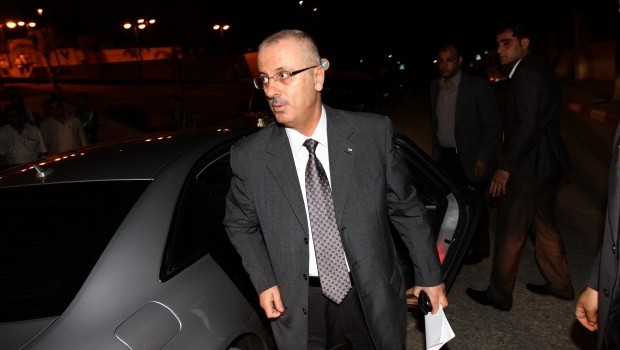
Rami Hamdallah arrives at the Al-Najah University in the West Bank City of Nablus after meeting with Palestinian President Mahmoud Abbas in Ramallah City, 22 June 2013 (EPA/ALAA BADARNEH)
Following the resignation of Salam Fayyed on April 13, Hamdallah was appointed prime minister on June 2, and sworn on in June 6. He submitted his request to step down from the position just 14 days later.
Hamdallah is an academic who previously worked as the dean of Najah University in Nablus. He had not held a high-profile political position in the Palestinian Authority prior to his nomination, and was a political independent.
When appointed, Hamdallah stated that his cabinet would serve only for a “transitional period,” to oversee the formation of a unity government that included figures from both Hamas, which controls the Gaza Strip, and the Palestinian National Authority (PNA), in the West Bank.
The two factions have been divided since 2006, following Hamas’s victory in that year’s legislative elections.
Although Mahmoud Abbas accepted Hamdallah’s decision, a spokesman for the president told reporters, “the president accepted the resignation of the prime minister and designated him to head an interim government.”
The reason Hamdallah gave for stepping down, a “conflict of authority,” is widely-held to refer to the appointment of two powerful deputy prime ministers, Muhammad Mustafa and Ziad Abu Amr, without being consulted by Abbas.
“The presence of two deputy prime ministers, who are friends of President Abbas, means that the prime minister is a powerless figure,” Hassan Khraisheh, a deputy speaker for the Palestinian Legislative Council said.
On a Twitter page claiming to be operated by Rami Hamdallah, a post published on Sunday stated: “The situation in this country forced me to resign. Conflicts, confusion, corruption. Palestine needs a real political reform. R.H.”
The Palestinian Authority, however, since claimed that Hamdallah does not have a Twitter account.
Speculation has now begun as to the identity of Hamdallah’s successor. Muhammad Mustafa, a senior advisor to President Abbas, has been touted as a candidate, while others speculate that Abbas may even appoint himself to the post.
